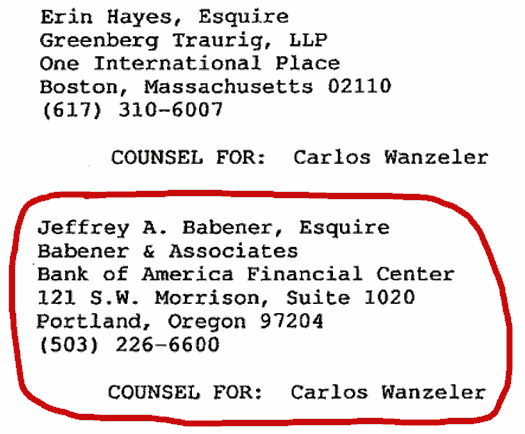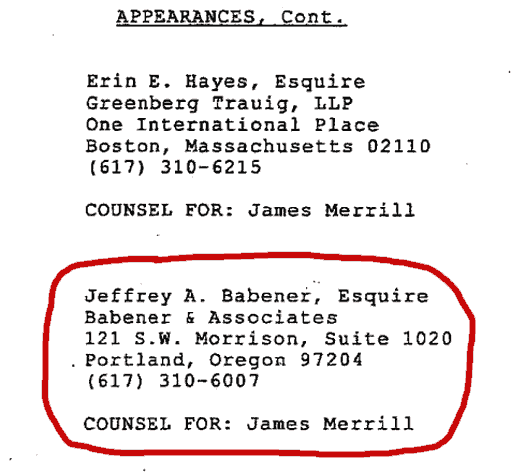Wanzeler seeks to delay TelexFree criminal investigation
![]() During the raid on TelexFree’s Massachusetts offices,
During the raid on TelexFree’s Massachusetts offices,
federal law enforcement seized various assets of TelexFree, including servers used by TelexFree, about 38 boxes of documents, and about two dozen computer drives.
The electronic data alone is believed to be over 400 terabytes of material.
As regulators continue to build their respective cases against TelexFree, the monumental task of sifting through the evidence faces potentially significant delays due to
all of the information seized from TelexFree first reviewed by a team of lawyers and paraprofessionals, whose duty would be to examine all of the documents and remove any materials that appear to be attorney-client privileged before the documents would be made available to the Governmental Authorities for use in Governmental Proceedings.
Seeking to speed up the investigation into TelexFree, Chapter 11 Trustee Stephen Darr recently approached the bankruptcy court with a request to waive TelexFree’s right to any attorney-client privilege.
The motion, if granted, would permit authorities to immediately begin sifting through the collected evidence and enable them to use anything they find to build their respective cases.
Opposing this motion is TelexFree co-owner, Carlos Wanzeler.
 Wanzeler (right) objects to the Trustee’s waiving of client-attorney privilege because
Wanzeler (right) objects to the Trustee’s waiving of client-attorney privilege because
because the record before the court is inadequate and insufficient for the Court to consider the issues presented or make the determinations the Trustee has requested.
Mr. Wanzeler intends to preserve all rights in this and any other proceeding to assert the attorney client privilege, the attorney work product privilege, and other applicable legal privileges, and intends to preserve all rights to further brief these issues when they arise in this or any other legal proceeding.
Mr. Wanzeler respectfully requests that the Court deny the Trustee’s Motion and delay any hearing or ruling until such time as a complete factual and legal record is presented to the Court.
That record could take months to present, as it would require the aforementioned “team of lawyers and paraprofessionals” to sift through the seized information.
That naturally suits Wanzeler, who is currently a fugitive on the run from US authorities. Wanzeler is currently hiding out in his native Brazil, living off millions of dollars he stole from TelexFree investors and then laundered out of the US.
Wanzeler goes on to argue
The Court cannot properly consider the Trustee’s Motion because the Trustee has not presented any of the basic facts that would be necessary to determine the proper waiver of the attorney-client privilege.
For example, the Trustee has not identified any of the following:
-Who are the attorneys?
-When were the attorneys engaged?
-By whom were the attorneys engaged?
-For what purposes were the attorneys engaged?
-Which entities or individuals did the attorneys represent?
-Which entities or individuals may have a basis to assert the attorney-client privilege or other legal privilege?
-What records exist that may contain potentially privileged information, what information is contained in those records, and who may have a basis for asserting that such records are privileged?
The first thought that comes to mind is, ‘Who cares?‘
Stephen Darr, in his capacity as court-appointed Chapter 11 Trustee of TelexFree has been put in charge of the company. The decision to waive client-attorney privilege rests solely on his shoulders.
Such to the extent that data seized may contain incriminating communications between Wanzeler and his lawyers, the data was seized from TelexFree’s office and is related to the day-to-day operation of the scheme.
If Wanzeler didn’t want authorities reading something in particular, perhaps he should have taken it with him when he fled the US.
Otherwise, the way I see it, anything left behind in TelexFree’s office is well within the rights of Darr to waive attorney-client privilege over.
If Wanzeler has any particular documents in mind he wishes to assert privilege over, perhaps he can jump on a plane and pay a visit to the offices of the FBI and Homeland Security to point them out.
Otherwise Wanzeler’s argument rings hollow.
Certainly the Trustee does not have the authority, and should not be given the authority, to waive any privilege that may properly belong to an individual or entity whom the Trustee does not properly represent.
You can’t chastise the Trustee for waiving client-attorney privilege on over 400 terabytes of material because stuff you don’t want regulators to see might be buried within, based on an argument that fails to identify anything specific you don’t want regulators to see.
And certainly not when months of delays hang in the balance.
One of the responsibilities of a court-appointed Chapter 11 Trustee is to “prevent delay” in any proceedings the estate they have been charged with presiding over is involved in.
I mean really, does Wanzeler truly think he’s going to get away with undermining the authority of the Trustee from his hidey-hole in Brazil?
Wanzeler lost any say in legal decisions affecting TelexFree the day the Massachusetts bankruptcy court deemed his puppet MacMillan incompetent and put Darr in charge.
One interesting aside is that Wanzeler’s filing reveals the extent of which MLM attorney Jeffrey Babener was involved in representing TelexFree. He also appears to have been engaged as Wanzeler’s personal attorney.

An excerpt from Wanzeler’s filing reads:
One example, which demonstrates the complexity of the issues to be resolved, the need for a detailed record, and the need for a mechanism to protect privileges belonging to others, arises from the engagement of Attorney Jeffrey Babener, of Babener & Associates, and Attorneys Mark Berthiaume and Erin Hayes, of Greenberg Traurig LLP.
In other filings with the Court, Attorney Babener and the firm Greenberg Traurig have been identified as having represented the TelexFree entities.
These same attorneys, however, have stated that they also represented Mr. Wanzeler, as well as James Merrill (who also was a co-owner, director, and/or officer of the TelexFree entities).
The transcript of an “on-the-record interview” of Mr. Wanzeler conducted by the Massachusetts Securities Division on March 26, 2014 reflects the
following:Q. Mr. Wanzeler, are you being represented by counsel today?
A. Yes, represented by counsel.
Mr. Berthiaume: As I mentioned at yesterday’s on-the record interview, Mark Berthiaume, Greenberg Traurig; with me is Erin Hayes, also Greenberg Traurig, and Jeffrey Babener. The three of us represent the company but are also representing Mr. Wanzeler for purposes of today’s interview.
Mr. Leone: And, Counsel, do you also represent anyone else in this matter?
Mr. Berthiaume: Well, we represent Mr. Merrill who testified yesterday.
Turns out Babener was also representing TelexFree co-owner James Merrill too.

As revealed in a recent filing by Stephen Darr, Jeffrey Babener advised TelexFree they were running a pyramid scheme back in August of 2013.
A well-known and respected MLM attorney, why Babener was still representing TelexFree and its owners seven months after he’d identified TelexFree as a pyramid scheme, is a mystery.
One month after Babener made an appearence on behalf of Wanzeler and Merill, the SEC and Massachusetts Securities Division shut TelexFree down for being a billion dollar Ponzi scheme.


What a sh**ty crook.
Just so you know, the last time we heard something about that Wanzeler guy in Brazil was during “Operation Orion”, when it became clear both Carlos, Wanzeler and Costa, should present themselves to the feds once a month.
Not even the “lawyer of the stars”, hired to represent Mr. Runaway, has mentioned anything about him anymore. Ditto Mr. Con Buddy, Carlos Costa, in his sweaty videos.
My guess? Wanzeler is enjoying yatches, beaches and all that millions of stolen money can buy. Maybe not for too long, as EY audit on Ympactus/Telexfree will be finished by mid October.
Just a Thought – If Carlos & Carlos really want this to go their way, perhaps they should shoot for an in camera hearing..
If you wanna a chance to win a brand new iPhone 6, Sann Rodrigues can solve your problem. In the following video he is promoting his new scam, iFreeX, and telling people that whoever joins his group may win the phone.
https://www.facebook.com/video.php?v=1478552695739585&set=vb.1413604745567714&type=2&theater
How can he and that Faith Sloan keep promoting those sort of schemes when they are forbiden to do so? This iFreeX is being promoted in Brazil as “Telexfree 2.0”.
I hope the judge makes it clear to Wanzeler that fugitives have little credibility and that he doesn’t get to dictate what should be happening in the TF case from his cubby hole in Brazil.
Unfortunately, from a technical standpoint, these new “business opportunities” have not been proven by authorities to be fraudulent so there is nothing legally barring Sann and Faith Sloan from engaging in them.
Also, I believe Sann is prohibited from selling unregistered securities, but, once again, legally the authorities have not formally labelled his new business as a sale of unregistered securities.
In other words, there is no way authorities can throw them in jail or punish them at this point in time just for engaging in an MLM venture or even moving money around in a court approved bank account.
By the time the legal system catches up and proves something as illegal, these scam artists have already moved on to other new scams similar to Sann’s participation in TelexFree and now moving on to other schemes.
However, they will lose credibility in the civil SEC case against them and any possible future criminal case. What they are doing shows no remorse and a lack of moral compass so ultimately the law will catch up to them. This is especially true of Sann who was told specifically in the past to not deal in unregistered securities.
This is dangerous ground. If the Court grants a waiver of privilege and the Appeals Court disagrees, people are going to walk no matter how compelling the evidence turns out to be.
Tough call, with far reaching consequences.
I’m not sure whether this is a sign of anything, or not, but Telexfree’s website seems to have been shut down for good. No more “we’ll be back stronger than never” message and no PING response or anything.
Chapter 7 coming soon?
@Diego
I noticed that too yesterday. Think it must have happened only very recently.
I wanted to check the Google analytics code used on the iFreeX site against TelexFree :(.
(edit: checked the cache, diff codes.)
It would be nice if the judge told him, “Come back to the U.S. and we’ll talk about it.”
on this subject.
i believe this document is the judges approval of Stephen Darr’s motion to waive the attorney-client privilege.
https://www.kccllc.net/telexfree/document/1440987140924000000000009
can anyone assert if this is so?
and if so. what does this mean. is everything full speed motion now as far as the investigation?
This is not an approval of Darr’s motion. None of the boxes are checked.
Judging from the notation at the bottom of the document and the immense significance of this motion, there was probably much heated oral argument both pro and con during the hearing.
One of the parties (probably the Trustee) is charged with submitting a Proposed Order to the Judge for his signature. However, both sides will review the transcripts to ensure they agree that such Proposed Order closely mirrors what was said and understood during oral arguments.
Ultimately the judge decides what he will sign of course, but since this is a very contentious issue both parties will have input into the Proposed Order and the judge will be mindful of what was said and argued in Court.
All of this suggests to me that Darr’s motion was approved in part and denied in part, that he was not given carte blance authority and that the terms of the waiver of privilege are limited, nuanced and subject to further objection and approval.
@ hoss
How about this document?
https://www.kccllc.net/telexfree/document/1440987140925000000000068
It says Motion is approved.
Yes it does
Per Document 490 filed on 9/24 “A PROPOSED ORDER SHALL BE SUBMITTED IN WORD FORMAT TO (Ozedit: email removed).”
Per Document 504 filed 9/25 The Judge signed the submitted Order approving Darr’s request for waiver of privilege while making it clear to all concerned that the Order does not extend to any “right or privilege held by Merril and Wanzeler that does not belong to the Debtors,” and the Court shall retains jurisdiction to enforce the terms of the Order.
Apparently there was some clarification desired concerning the original Motion as approved,